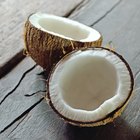
In composting, raw organic matter is broken down into a usable product that can amend soils to make them more fertile. You can use several methods to compost organic matter, including vermicomposting. This method uses earthworms, which actually compost organic matter by eating their way through it. In turn, they leave behind excrement castings which, when added to soil, can improve its physical, chemical and biological properties, according to the Purdue University Extension.
Recycles Waste
Vermicomposting helps to recycle many different kinds of organic wastes. The raw materials for a vermicomposting project are readily available in most homes. They can include kitchen waste, paper products, leaves and other yard waste, and manure and other organic waste materials. The only organic wastes that worms cannot compost are bones and oily or fatty substances.
Has Low Costs
After initial outlay for the proper equipment, producing vermicompost is relatively inexpensive, compared to its value as a soil amendment. Production processes are scalable and can range from a simple vermicomposting box for home use to larger production operations that manufacture vermicompost for commercial sale. Also, the worm species required for vermicomposting are readily available, and care and upkeep is minimal.
Helps the Environment
Vermicompost is a renewable and environmentally friendly resource. A totally natural product, vermicompost can help reduce the need to apply chemical fertilizers, which is a less sound practice from an ecological standpoint. Vermicomposting can also help to reduce the amount of organic waste disposed of in landfills. According to the FootHill Worm Ranch, an average family with a small 2 foot by 4 foot worm bin can prevent more than 1,400 lbs. of organic household waste from entering landfills each year.
Contains More Nutrients
According to the Purdue University Extension, vermicompost provides high amounts of plant nutrients, including nitrogen, phosphorus and potassium. Typically, vermicompost has more than twice the average amounts of these nutrients, compared to commercial potting soil. Vermicompost may also contain plant growth regulators that improve plant growth. The nutrients in vermicompost can help plants grow more vigorously, produce bigger blooms and both increase and improve the quality of crop yields.
Provides Other Benefits
Vermicompost is a fine, peatlike humus that is easy to add to soils by either working it directly into the topsoil or applying it to the surface as a mulch. Screened vermicompost makes a good ingredient for potting soil mixtures. Vermicompost is also a much more available and plant-friendly fertilizer. The nutrients within it will not burn sensitive plants, as chemical fertilizers are prone to do when heavily applied. Vermicompost also contains beneficial microbes that are essential to healthy soil.
Related Articles

The Effects of Organic Fertilizer on ...

What Are the Uses of Vermicompost?

Environmental Impact of Disposable ...

List of Biodegradable, Every Day ...

The Disadvantages of Vermicompost

How to Extract Eucalyptus Oil

Health Benefits of Organic Foods Vs. ...

What Is a Synthetic Polyester Fabric?

Organic Vs. Conventional Olive Oil

Advantages of Paper Bags vs. Plastic ...

Purpose of Moth Balls

What Is Transitional Housing?

How to Treat Anemia in Sheep

Uses of Coconut Fiber

How to Make Organic Shoe Polish

Which Plastic Bottles Are Safe?

Uses of Macadamia Nut Shells

What Effects Do Polyester Factories ...

Ingredients in Trader Joe's Shampoo

List of Ways to Conserve Mother Nature
References
Writer Bio
In Jacksonville, Fla., Frank Whittemore is a content strategist with over a decade of experience as a hospital corpsman in the U.S. Navy and a licensed paramedic. He has over 15 years experience writing for several Fortune 500 companies. Whittemore writes on topics in medicine, nature, science, technology, the arts, cuisine, travel and sports.
Photo Credits
worm image by Ksenija Djurica from Fotolia.com